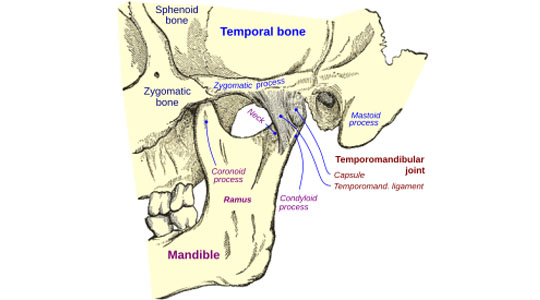At Mcknight Square dental we are equipped to provide customized dental appliances to fit your oral needs and function. The appliances such as Night guard (Bruxism appliance), Mouth guard and Sleep Apnea appliances help improve your quality of life and prevent deterioration of oral and general health.

Temporomandibular joint dysfunction (TMD, TMJD) is a broad term covering pain and dysfunction of the muscles of mastication (the muscles that move the jaw) and the temporomandibular joints (the joints which connect the mandible to the skull). The most important feature is pain, followed by restricted mandibular movement and noises from the temporomandibular joints (TMJ) during jaw movement. Although TMD is not life-threatening, it can be detrimental to quality of life, because the symptoms can become chronic and difficult to manage.
TMD is a symptom complex rather than a single condition, and it is thought to be caused by multiple factors. However, there is a disagreement as to their relative importance. There are several treatment modalities available, although there is a general lack of evidence for any treatment in TMD, and no widely accepted treatment protocol. Common treatments include provision of occlusal splints, psychosocial interventions like cognitive behavioral therapy, physical therapy, and pain medication or others. Most sources agree that no irreversible treatment should be carried out for TMD.
About 20% to 30% of the adult population are affected to some degree. Usually people affected by TMD are between 20 and 40 years of age, and it is more common in females than males. TMD is the second most frequent cause of orofacial pain after a tooth ache.
Signs and symptoms of temporomandibular joint disorder vary in their presentation. The symptoms will usually involve more than one of the various components of the masticatory system, muscles, nerves, tendons, ligaments, bones, connective tissue, or the teeth. TMJ dysfunction is commonly associated with symptoms affecting cervical spine dysfunction and altered head and cervical spine posture.
Pain and tenderness on palpation in the muscles of mastication, or of the joint itself (preauricular pain – pain felt just in front of the ear). Pain is the defining feature of TMD and is usually aggravated by manipulation or function such as when chewing, clenching, or yawning, and is often worse upon waking. The character of the pain is usually dull or aching, poorly localized and intermittent, although it can sometimes be constant. The pain is more usually unilateral (located on one side) rather than bilateral. It is rarely severe.
Limited range of mandibular movement which may cause difficulty eating or even talking. There may be locking of the jaw, or stiffness in the jaw muscles and the joints, especially present upon waking.There may also be incoordination, asymmetry or deviation of mandibular movement.
Noises from the joint during mandibular movement, which may be intermittent. Joint noises may be described as clicking, popping or crepitus (grating).
These are used as a cushion to safeguard the health of your oral hard and soft tissues during high impact sports or adventure training. Boxers, Fencers, Skaters often wear them to prevent damage to their teeth and smile during an event.
These appliances act as a barrier to disrupt forces during function (mastication/Bruxism) and direct them to a more vertical direction, preventing wear of teeth, soreness of facial musculature and symptoms of the TMJ’s. These prevent temporal headaches and generalized soreness in oral function.

Obstructive Sleep Apnea (OSA) or commonly referred to as sleep disorders disrupts your sleep cycles and negatively impact your overall health. When you fall into deep sleep, your tongue, soft palate and oropharynx tissues fall into a relaxed state thereby causing obstruction to the airway. For those who snore, these relaxed throat tissues cause the airway to restrict, creating the sound of snoring as oxygen is forced past the vibrating soft tissues.
Snoring and sleep apnea devices work by moving the lower jaw forward along with the tongue musculature to open up the air ways and improve the breathing, preventing recurrent episodes of apneic attacks.